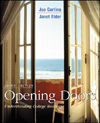Opening Doors is designed to help college students move from a pre-college
reading level to a college reading level. It presents a systematic way of approaching
college textbook material that can make students more efficient in the study
skills integral to their college success. While the scope of this book is broad, the focus is ultimately on comprehension.
Comprehension skills are introduced early in the text and are integrated throughout
subsequent chapters so that students learn how to apply them. Though the emphasis
is on main ideas and essential supporting details (Part Two, Comprehension),
the book gives thorough attention to skills that range from predicting and questioning
actively as you read (Part One, Orientation), to selecting, organizing and rehearsing
textbook material to be learned for a test (Part Three, Systems for Studying
Textbooks). In Part III, students learn how to use textbook features to full
advantage, how to underline and annotate textbook material, and how to organize
material in writing so that it can be mastered for a test. Although Opening Doors is designed for developmental readers, we have
chosen to use only college textbook excerpts and other materials students would
be likely to encounter in college. The selections are the result of field-testing
with hundreds of our students over several semesters to identify material that
is interesting, informative, and appropriate. We believe that this extensive
field-testing provides a much more useful indicator of appropriateness than
a readability formula. Field-testing revealed that, with coaching and guidance
from the instructor, students can comprehend these selections. Equally
important is that students like dealing with "the real thing"--actual
college textbook material--since that is what they will encounter in subsequent
college courses. This type of practice enables them to transfer skills to other
courses and avoid the frustration and disappointment of discovering that their
reading improvement course did not prepare them for
"real" college
reading. Finally, these passages help students acquire and extend their background
knowledge in a variety of subjects. |



 2002 McGraw-Hill Higher Education
2002 McGraw-Hill Higher Education

 2002 McGraw-Hill Higher Education
2002 McGraw-Hill Higher Education